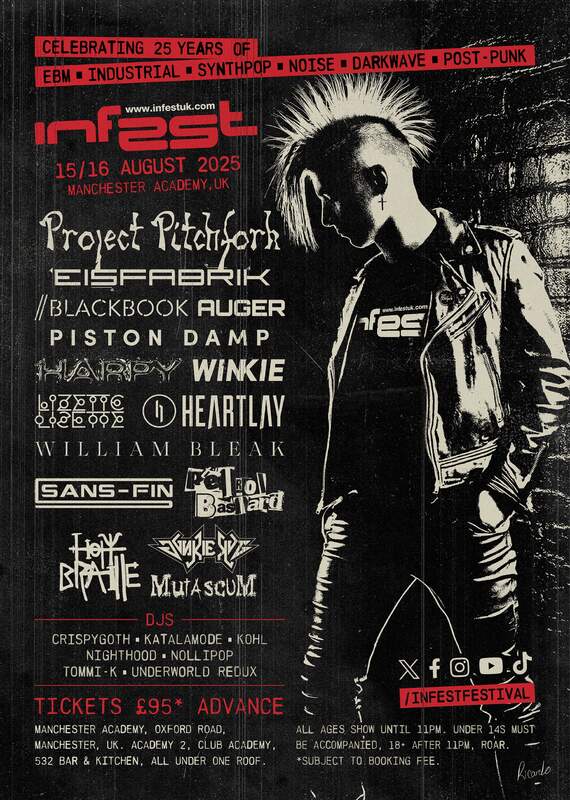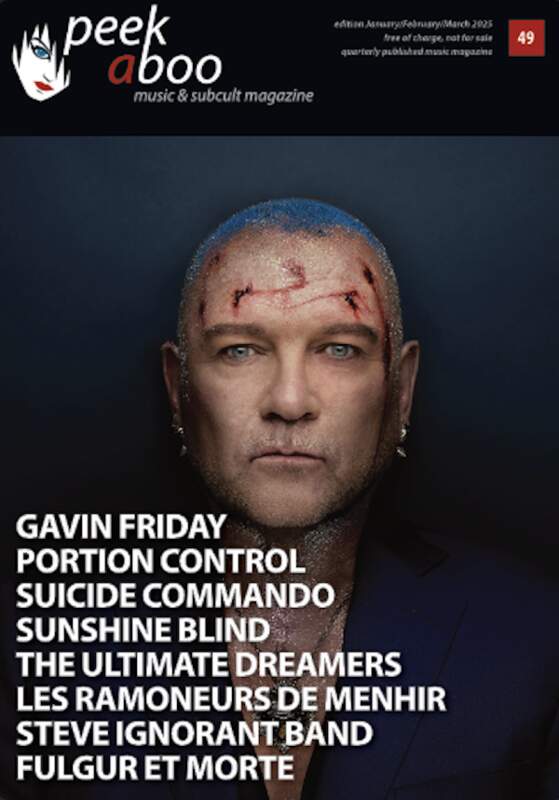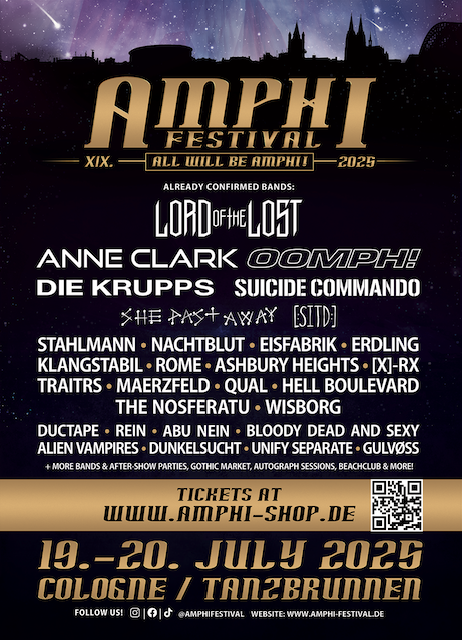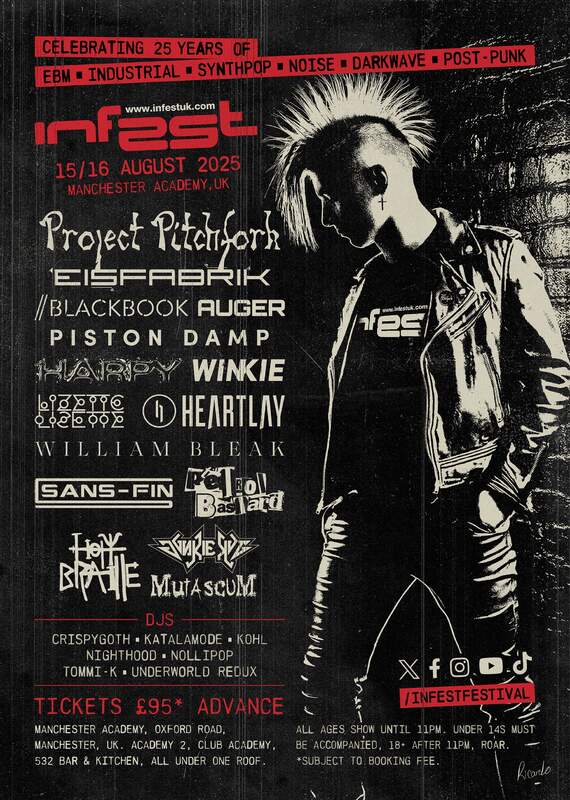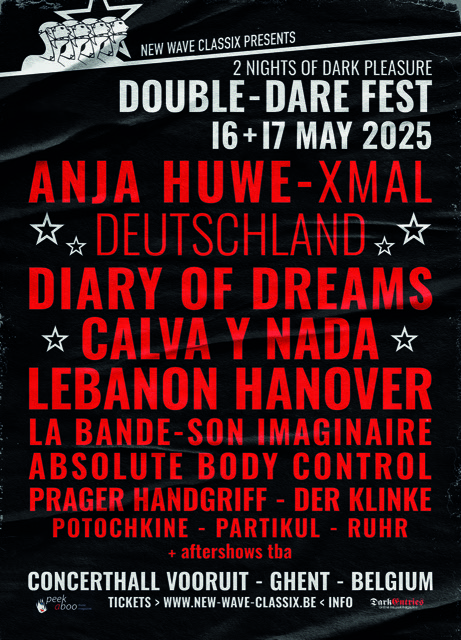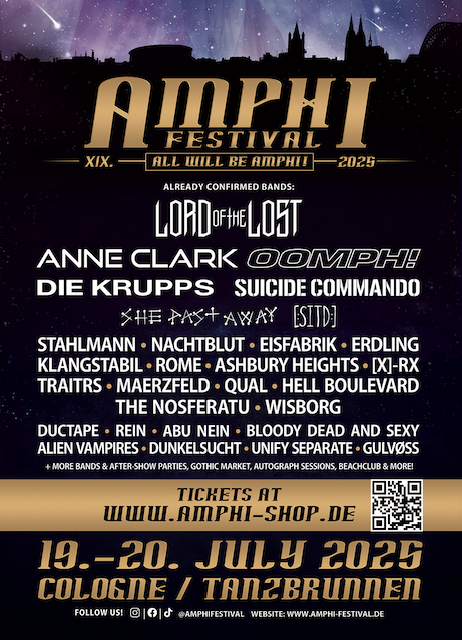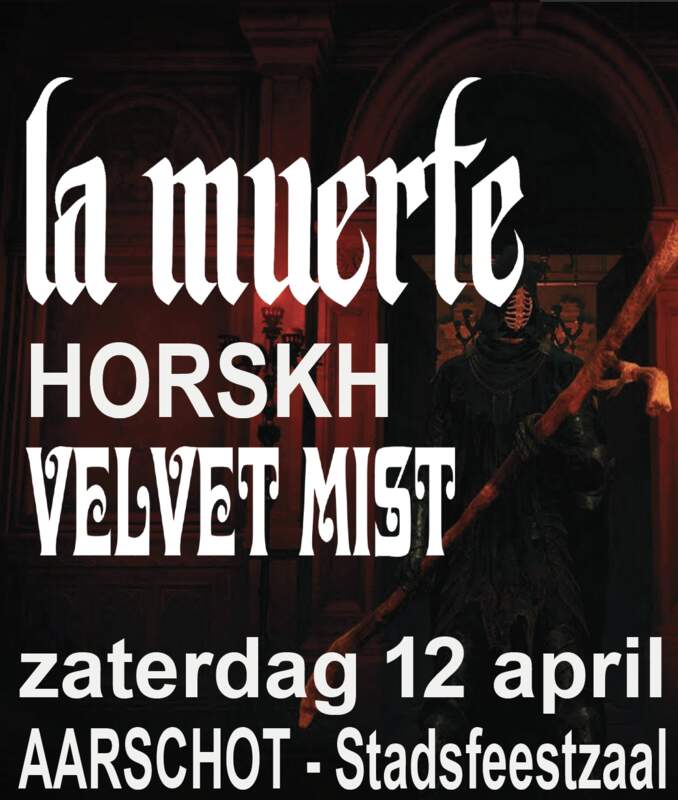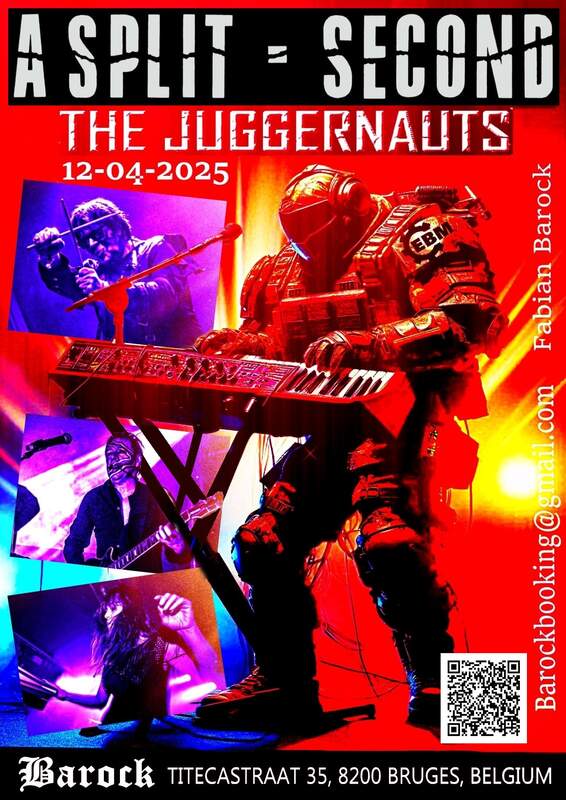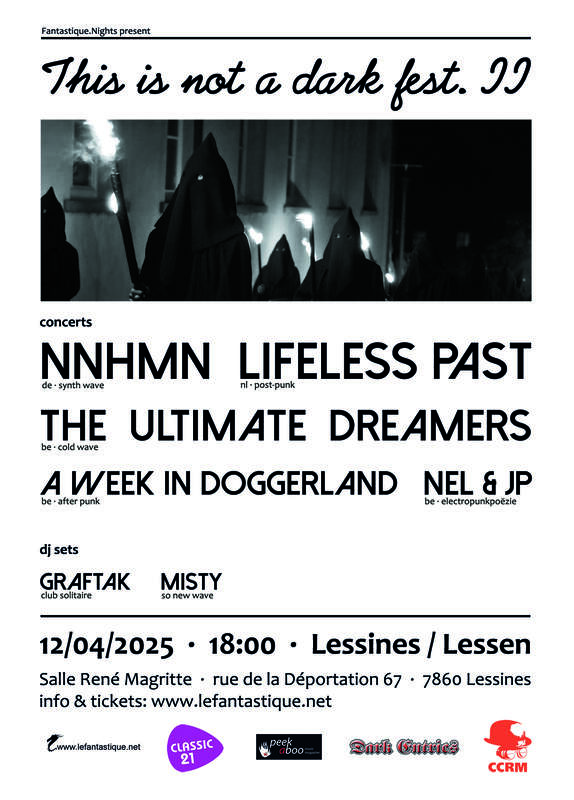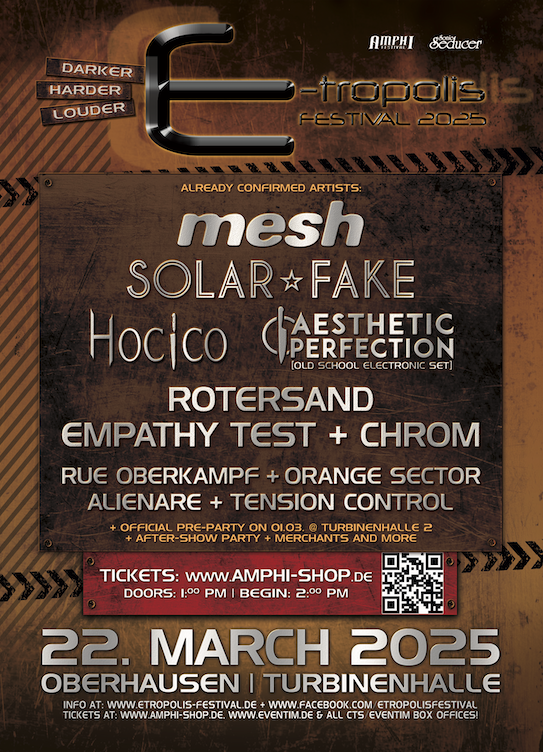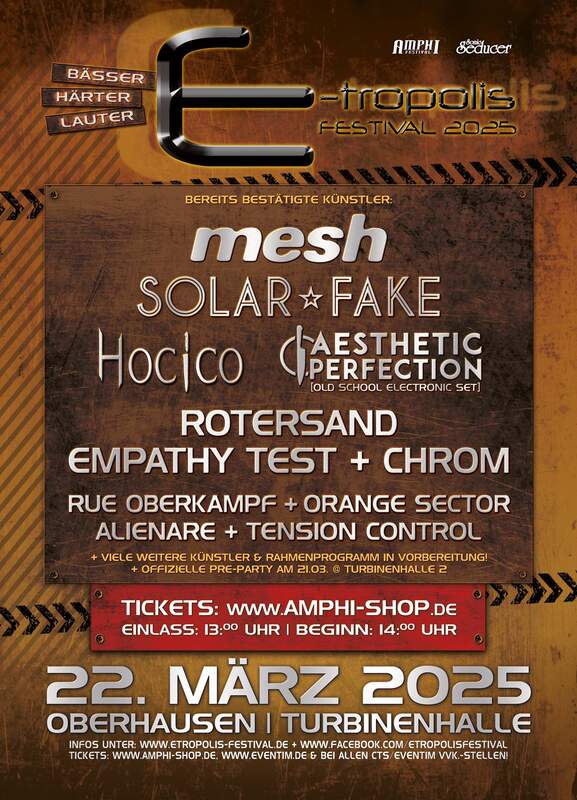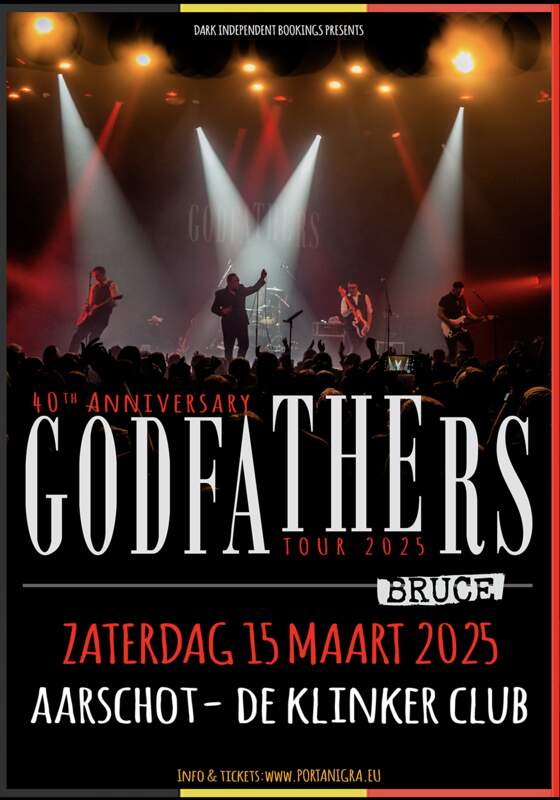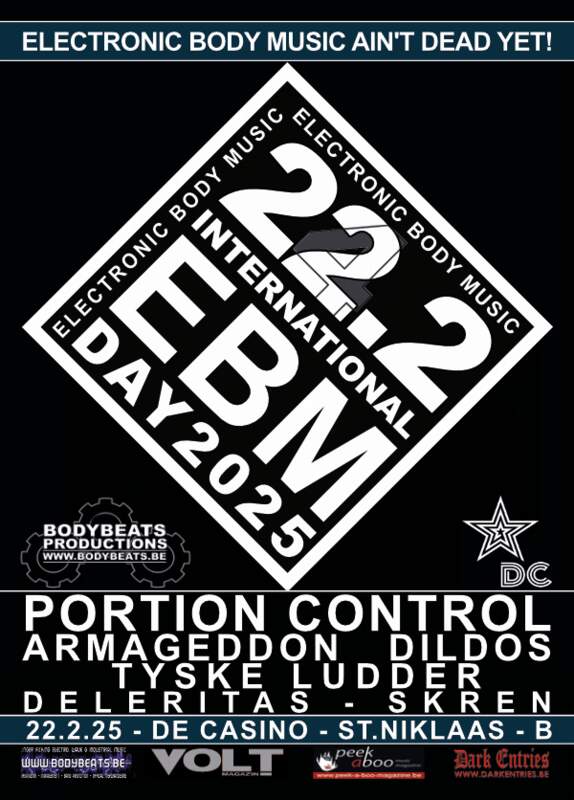STEPHANE FROIDCOEUR (SIDE-LINE MAGAZINE / NEBULA-H)
It’s crazy to see what the power of simply being a little bit famous can do with people and their entourage.
21/08/2013, Jurgen VANVLASSELAER
Stéphane Froidcoeur aka Deranged Psyche is a man of many talents. Not only was he one of the first employees of Belgium's Side-Line Magazine, but he's also the vocalist of NEBULA-H and former member of bands such as Fuze Box Machine, Ex.Es and Toxic Shock Syndrome. But above all, he's a very nice guy with dozens of interesting stories about the electro-goth-industrial music scene.
Welcome Stéphane. Do you remember when music moved you for the first time?
That was quite a long time ago. I started listening to music when I was about 13 or 14 years old, and got seriously infected by the new-wave movement when I was 15 (1983). The first bands that had a real impact on me were Front 242, The Danse Society, The Neon Judgement, Einstürzende Neubauten, Siglo XX, The Sisters Of Mercy, SPK, The Klinik, Cabaret Voltaire, Test Department...
Do you remember the moment when you decided to make music yourself?
That happened around the same time; somewhere in the midst of the 80s. I was 17 years old when together with some class mates we set up an electro-punk band. It was nothing very serious, but I rapidly joined another post-punk band (4-Fauste). We released a demo tape and did a few live gigs in the neighbourhood of Tienen – my hometown. Olivier Adams, known from Praga Khan and also from Tienen, even played a gig as drummer. Later on I joined another punk band (H-Berion), which was influenced by the French punk scene and bands like Bérurier Noir, Ludwig von 88 etc. One of the members and guitarists was Danny Casseau who became - and still is - a very famous techno/hardcore DJ, producer and label owner.
I was already seriously infected by the electro virus during my punk period and so I met Séba and Benoît from Side-Line. I joined the magazine around 1991. That was the year we organized the unforgettable Side-Line festival in the Brussels' VK. It was a really important festival; seeing Project Pitchfork performing for the very first time outside Germany. Fuze Box Machine was invited as well, but as their singer couldn’t make it they went in search of a vocalist. As I already had some experience as singer I accepted this challenge. I became a member of Fuze Box Machine and went on with a few more electro-projects.
You are / were a member of several bands: Fuze Box Machine,Toxic Shock Syndrome, Ex.Es, NEBULA-H to name the most important ones. Fuze Box Machine is back, but without you. Toxic Shock Syndrome (with Johan Van Roy) has not been active for years now. But what about Ex.Es and Nebula-H?
NEBULA-H is still on stand-by and it’s not sure if we’ll reactivate the project. Five years is quite a serious lapse of time inbetween 2 albums and there’s nothing in the pipeline so far. There were demos to achieve a complete new album, but we all have our own lives and projects and so far nothing has happened.
On the other hand, I know that Mika wants to work on these demos so you never know. We’re getting older and a lot of things have changed in our private lives. I’ve got less time these days because of my daily job and I went through some health problems, which aren’t that encouraging to move on with a band.
I’m no longer involved in Ex.Es because of some internal disagreements between Bart and myself. We didn’t share the same ideas about this project so I decided to quit. That was around 2-3 years ago already. I think Bart is still trying to find a label for Ex.Es, but it looks like it’s not all that easy to find the right one.
You made 3 albums with NEBULA-H , but I always had the feeling that the project never got the attention it deserved. I remember when the first album came out, people didn’t know what to think of it, cause you were one of the first bands who mixed techno elements with EBM.
I think we maybe got more recognition than you think - definitely outside of Belgium, and especially after the debut album “H”. We always tried to compose the music we like, with conceptual lyrics dealing with arts and especially painters. We were definitely not the first ones to use techno & goa elements in our music, but our sound was quite different from the usual dark-electro standards and old school EBM. Some people liked it, others not... it’s not that different for other bands.
I think the main innovative element was the on stage presence of a live VJ who was active in the psy-trance scene. Goahoma got total freedom and I guess it was a big surprise for a lot of people to watch her psychedelic image loops. It was quite different from the usual horror themes used and abused by dark-electro acts.
Did Ex.Es ever release an album? Or just a track here and there that ended up on some compilation?
Several songs have been featured on samplers, and even a few big ones, but the album never saw the daylight. I know Bart was in touch with a few labels, but nothing really happened. It’s a pity because Bart has written a few great songs.
I know you were thinking of starting a new project. Will that be the case or did you decide not to go through with it?
Mika had the idea to work on some demos that were originally meant for NEBULA-H, but I don’t know what he’s doing actually. The sound and influences were more electro-minimalism.
One thing is for sure, I'm not ruling out getting back into music as an active participant but it will be not as a full-time member, just singing a few songs and that’s it. I no longer want to get involved in the writing process. I’m 45 years old now and even if I don’t feel like an old man (laughs), I think I’ve seen it all. I no longer want to spoil an entire weekend to play 45 minutes on stage somewhere in a foreign club. Don’t get me wrong, getting on stage is fun, but all the stuff surrounding it has been never my cup of tea. I prefer doing other things I like with real friends.
You also work for one of the largest, maybe even 'the' largest electro-industrial magazine in the scene: Side-Line. You have been part of that team since nearly the beginning if I am correct. How did you end up with them?
I joined Side-Line in 1991. Back then I wanted to set up a magazine (fanzine like we call it) myself dealing with electro-underground music. I even remember to have contacted bands for interviews, but I received no replies. I got a flyer of Side-Line featuring some extra information about Séba Dolimont who was in search to swap tapes with other electro-underground lovers. Swapping tapes was quite a common thing in the 90s and I was already swapping tapes with other people. So I got in touch with Séba and we decided to meet. It seems that he was impressed by my background in the electro scene and quite naturally I finally joined in writing my first reviews and soon lending a hand with the interviews.
I don’t know if there’s anyone else in the scene that has been writing for a magazine for more than 20 years, but I think I must be one of the last dinos in the genre (laughs).
Where did your alias Deranged Psyche come from?
That’s a very old story as well. When I was at school in Tienen we used to share vinyl records with a couple of mates, but all of them didn’t really like the music I was listening to. They said it was music made by ‘deranged’ people and I simply answered that in that case, you had to be even more deranged to buy the records. It was a way to say that they considered me as being ‘deranged’ myself. So as a teenager of 15 years old I promised myself that if I ever got involved into music I would use the nickname ‘deranged psyche’... so in the end it’s all about the dream of a teenager.
Stéphane Froidcoeur is also a quite difficult name to remember so I definitely kept my promise and chose Deranged Psyche.
You have interviewed hundreds of bands, reviewed thousands of albums. Can you remember your first interview? How did that go?
Honestly I can’t remember the first band I ever interviewed, but again it’s a long time ago. Most of the interviews were done at festivals face to face, but also by post.
What I can tell you is that I definitely kept some interviews in mind. I remember doing an interview by phone with Ben Watkins (Juno Reactor) in 2000. I consider Watkins as one of the greatest geniuses in electronic music and of course the Godfather of goa-trance. He’s such a nice guy with whom I had a nice chat, but doing an interview with Ben Watkins was something special to me.
I also had the chance to interview Sevren Ni-Arb of X Marks The Pedwalk. What made the interview that special is that André (Sevren), next to Ben Watkins, is the other electro artist I deeply respect for his work and genius. I especially like his arrangements and progression in songs.
Quite different was my interview with Joël-Peter Witkin. Witkin is an American photographer who’s famous worldwide for his provocative, obscure and often shocking work. I wasn't in touch with him directly, but thanks to a gallery owner who organized an expo of Witkin in Belgium, Witkin accepted to answer a few questions by mail. I did this interview in a Side-Line series called ‘Art-Line’.
These days we have email, but in those days it was interviewing by snailmail, phone or face to face before a gig or so. Good old times, or do I look back on it too romantically?
I’m not that into nostalgia you know, but the good thing about interviews in the past was that it was much more personal and interactive. We interviewed a lot of artists face to face at festivals and it was a way to get more spontaneous interviews where you can interact with some of the answers. It definitely is more professional and a way to get more information from an artist. It’s not that different with a phone interview, but at the other side it took a lot of time to write everything down and that was always a real hell!
Today everything is so easy, just sending your questions/answers by email and the job is done.
But the important elements for a good interview are to always prepare your questions seriously (for the journalist) and getting an artist who really wants to collaborate by elaborating his answers.
With Side-Line you gave a lot of artists their first platform in the music business by interviewing/reviewing them or using one of their tracks on the Side-Line compilations. Maybe a question you don’t want to answer, but from all the people you interviewed for Side-Line, who made the biggest impression on you and who was the biggest disappointment?
That’s a hard one, but don’t expect me to give names of artists/bands who were disappointing in their global attitude. That would be a kind of publicity for them and as a famous band once said ‘any publicity is good publicity’, plus it wouldn't be very ethical coming from a journalist... but I can tell you that I met a few arrogant artists. It’s damned crazy to see what the power of simply being a little bit famous can do with people and their entourage. Some managers and label owners sometimes aren’t that different.
I’m going to tell you a funny story about Rammstein. It’s not that much about arrogance, but when they released their debut full-length no one had ever heard about Rammstein. I was deeply impressed by the album and I got in touch with their manager to fix an interview. There was no problem with an interview and they were even honoured that a foreign magazine contacted them. But in the meantime, David Lynch got in touch with them and used 2 of their songs for his movie “Lost Highway”. So, the contact was suddenly broken because we probably were no longer ‘big’ enough to interview Rammstein.
On the other hand, I've always met a lot of very accessible artists and label owners with whom it has been a pleasure to work. As a journalist, you always remember the interviews with artists you like, but the interview with Juno Reactor was something really special.
Have you ever been so disappointed in an artist that you couldn't listen to his music anymore? I remember the first time I saw The Eternal Afflict live, and I got so annoyed by the behaviour of Cyan that I couldn't listen to their albums anymore for years.
Cyan indeed is/was a special one.. was he just playing a role or was it just his personality? The answer probably lies somewhere inbetween. I prefer to remember him as a great showman!
I think my job as case manager working for a psychiatric hospital has helped me a lot to conserve my neutrality. I heard some artists/label owners saying some real bad things about me and/or Side-Line but always behind my back. It’s so damned easy to make a post on Facebook saying nonsense about someone, because you got a bad review and/or because people find me arrogant as well. How can you say someone is arrogant if you've never even taken the time to speak with and/or exchange some points of view with somebody?
Well, I’ve never reacted and lost my time on such stupid reactions and it has never influenced my opinion on a further cd-review of a band and/or release of a label. So, those artists/labels sometimes got a very positive review after having said bad things because the album deserved a good review, but in the end, good or bad, a review will always remain subjective! But I would lie to you if I said that deep inside I sometimes wasn’t shocked about things I heard. But then you have to make a choice: put your energy in starting stupid fights on the net with those people or simply moving on with my passion for music.
It’s damned crazy to see what ‘power’ can do with people! Because they’re a little famous, it can have a real impact on their behaviour. From my point of view working in psychiatry, it’s quite fascinating to observe such kind of behaviour.
But globally speaking I only have/had a few troubles with bands & label owners. Most of the people respect my work for Side-Line. I know Bernard (Van Isacker) has put a few bands/labels on a kind of black list because their attitude was unacceptable... and no I’ll not give you their names.
You also must receive the weirdest releases to review. What was the biggest “wtf is this" moment ?
Here again I can’t really tell you, but there was a time Side-Line simply reviewed all the stuff we were sent. It ranged from commercial music to very specific kinds of metal music to extremely experimental releases to jazz music etc.
The funniest thing was when I did an interview with a brand new metal magazine. They contacted me because I did the metal reviews for Side-Line. I’ve been never into metal music and I don’t have any metal background, but they contacted me as a specialist in metal music.
Did you ever refuse to review or interview a band, because of their political ideas for instance?
I did, but only a few times. Speaking for myself I think that artistic freedom is quite important, but there are limits! I can’t accept that animals get mistreated and tortured for a simple artistic goal - referring to a famous Belgian artist who excels in the genre!
Politics is quite a dangerous subject when it’s featured in arts, but it’s not that different. To give you an example I remember the impact Oi! music had on me. I was a teenager, I enjoyed punk music and Oi! punk definitely was something special. I was about 15 years old, but I immediately understood the kind of message behind the lyrics and I couldn’t agree with the pure racist ideology, so in the end I never bought any Oi! record.
If you want to get involved into politics, just become a politician, but stop using arts as a tool to spread political ideas. It’s especially ambiguous and dangerous when it concerns extreme ideologies (right or left). Some bands and especially music styles like punk, neo-folk, martial music… are quite controversial.
Don’t get me wrong, I don’t have a problem with these genres, but some of the references and inspiration and used symbolism sometimes move far beyond the limits of artistic freedom and especially when it comes to reject the freedom of a man because of his origin, the color of his skin or a different language. I usually make a mention about the controversy in the review, but when the content is too explicit I simply refuse to make a review.
I’m very concerned about politics, but I don’t want to mix music and politics. It’s a dangerous cocktail that could seriously infect the innocent minds of music lovers!
Are there any new bands we have to keep an eye on? Who do think will be the next ‘big thing’?
Hard to say because the music business including the underground scene is going through a serious crisis and change as well. There are so many bands, you can no longer see the wood for the trees (laughs). Music became that easy to spread around because and thanks to/of new technologies.
If you’d asked me this question 15 years ago, I would have answered you without any hesitation.
I remember doing a gig in Berlin with Fuze Box Machine in the early 90s. The guy who organised the gig passed me tapes of Terminal Choice, which impressed me a lot. Later on when Fuze Box Machine got signed to Cyberware Productions I recommended Terminal Choice to the label owner. He was impressed as well and they got signed on Cyberware. Chris Pohl’s side-project Seelenkrank was a way of recognition, as Seelenkrank was directly inspired by my nickname ‘Deranged Psyche’. We all know what happened with Terminal Choice and all the other projects of Chris Pohl. What I mean is that it was much easier to predict the ‘new, next sensation’ while today I sometimes can’t understand why some bands remain anonymous. Today it’s all a matter of meeting the right people at the right place and the right moment. It’s a matter of not only working hard on the composition of music, but also to have an image, to get active on the net and getting a label, which does a great promotional job. A manager is also something essential.
Who knows bands like [In]Toxin, Frontier Guards, Geomatic, Tenek, Na-Hag... they have all released several productions, but not a lot of people have ever heard of them.
Equitant is another project in the genre, having released an impressive number of digital releases, but who knows it? I tipped the project to a few labels and EK Product finally decided to sign the band, who'll get a cd-release for the very first time. Equitant stands for minimal tech-body music and is my personal next cd-big thing.
You have seen the music industry evolving from up close. From the good old vinyl releases and cd’s to digital downloads on platforms as Spotify, iTunes etc. What are your thoughts on this evolution?
We have to face the truth, the cd market is progressively getting replaced by the digital era. Some bands and labels don’t believe it, but just ask teenagers how many cd’s they’ve bought in their young lives? And teenagers have never been the main potential cd-buyers so it means that generally speaking people are no longer buying cd’s today. Some artists and labels only work with digital productions, live streams etc... and once you’re using these platforms and technology you'll rapidly realize a new world is opening in front of you. Spotify has been a great help.
On the other hand I miss the good old artwork of a cd including a booklet with some extra information. It’s something you can hold in your hands and that’s the difference with the digital technology. That’s why I think cd’s will become a kind of item for collectors... just like it happened with vinyl!
I can’t understand bands and labels that don’t want to get placed on digital platforms like Spotify. It’s their total right and freedom to do so, but because of their rigid principles they avoid to touch a wider and new audience that would possibly buy their music (digitally). Ask labels, the digital sales are often more important than cd-sales. Only big names signed on leading labels are able to sell over 500 copies today. Only the absolute leading formations of the scene can still easily go over 1000 copies... but what is an average signed band selling today? Maybe 200 to 300 copies... Just ask distributors and you’ll hear a lot of bands aren't even reaching 100 copies, sometimes even less than 20 copies,you won’t believe it!
So in the end we have to evolve together with the technology... you’ll see. The labels who have understood this change are progressively preparing for the future and I’m afraid the others will disappear...
Final word?
I’ve already told you enough, but thanks for your time and consideration.
Thank you Stephane for the great answers and all the best with everything you do!
Jurgen VANVLASSELAER
21/08/2013
Next interviews
DUCHAMP • Music can be such a powerful way to connect people and I am beginning to understand this more and more
THE ARCH • Yes, we are ambitious, we have to be. Otherwise there is no point continuing.
DIORAMA • We have built a certain niche, which has advantages and disadvantages
AUTO-AUTO • You can call them sick and disturbed, but they make great music and are not afraid of calling 999 bands suckers!
XMH • Working together with Erk Aicrag from Hocico or Nic Endo from Atari Teenage Riot would be great!
KARL BARTOS • The Fukushima reactor disaster confirmed once and for all that renewable energy forms alone can secure progress and our future.
CHRISTIAN WOLZ • Celebrating 25 years of music
HUMINOIDA • One thing that amazes me is that some people seem to take the song lyrics VERY literally. I mean, there are serious topics on HUMINOIDA records, but then there's this surreal and pitch-black crap as well.
ZWARTE POËZIE • I wanted to show people what could have been possible if we in the Netherlands would have been making Wave in our mother tongue.
EVI VINE • I think we're actually going back to where we started from. For me, it's moved in full circle, it's like I'm coming home again now...





